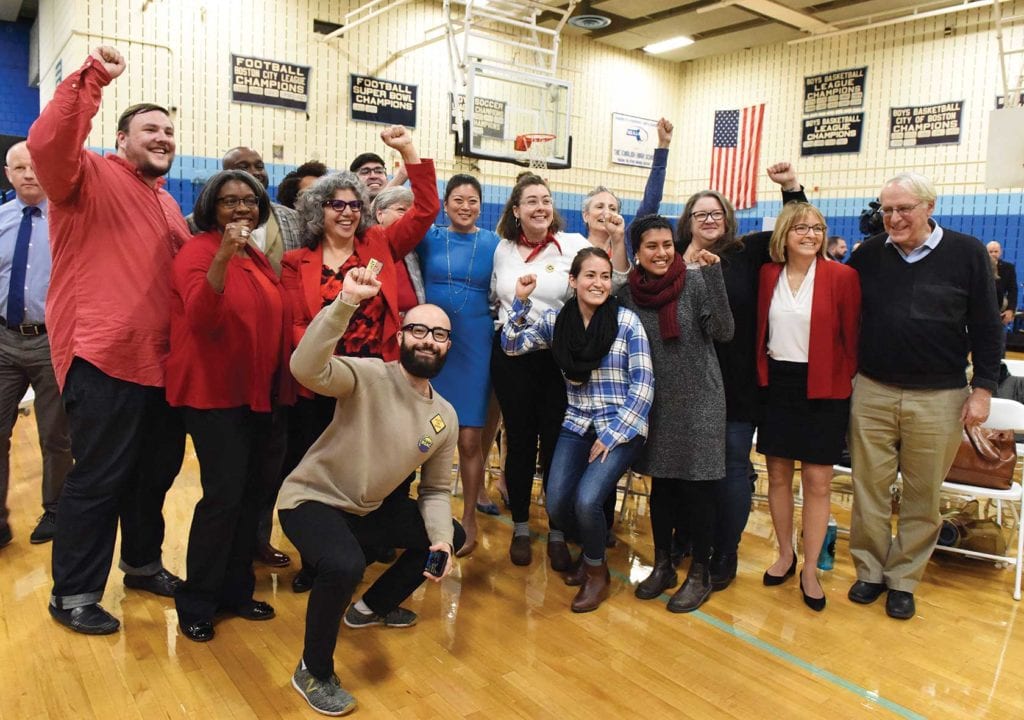Activists, BPS superintendent envision more resources for schools
Student Opportunity Act could bring in up to $100 million for Boston

State legislators and local officials gathered at Boston English High School in Jamaica Plain last week to mark the signing of the Student Opportunity Act, a law that will increase state funding for public schools by $1.5 billion over the next seven years, ensure that cities are reimbursed for funds lost to charter schools and increase funding for the state’s school building fund.
Under the new law, Boston schools are expected see a hike of as much as $100 million in state funding over the next seven years, along with increased charter school reimbursements.

Teacher Zena Link, State Sen. Sonia Chang Diaz and state Reps. Mary Keefe of Worcester and Aaron Vega of Holyoke enjoy a moment after the Student Opportunity Act was signed into law at English High School. PHOTO: COURTESY SONIA CHANG DIAZ
Boston Public Schools Superintendent Brenda Cassellius told WGBH she wants the state funding to go directly to serving students.
“I want us to have more opportunity for rigor within schools,” she told Basic Black host Callie Crossley. “We need more opportunities for advanced course work, more opportunities for art and music and support systems for children and their families — social workers, counselors, those kinds of things.”
Boston Teachers Union President Jessica Tang echoed Cassellius’ call for spending increased funding on BPS students, noting that her union recently negotiated a provision for full-time nurses in every school.
Tang said students should also have access to social workers, psychologists, librarians, libraries and full-time art teachers, and to physical education.
“We agree with the superintendent that the funding needs to get to the students in their schools,” she said. “It’s about values to me. Do we believe that every child in public education deserves access not just to academics, but also other types of education beyond math and reading? If we do, we have to budget our staffing and schools for that.”
Tang also highlighted another longstanding demand from BPS teachers. While teachers often are required to carry multiple certifications to teach English language learners and learning-disabled students in “inclusion” classrooms, many teachers say the inclusion model only works when there’s adequate staffing. Tang said inclusion classrooms should have at least two teachers and a paraprofessional.
“It has to be more than just one teacher and one paraprofessional who is often pulled away to other classrooms,” she said.
In many ways, Boston has faced the kinds of increasing costs over the last 25 years that prompted the Legislature to update the school funding formula, which was originally set in 1993. Since that year, when the Legislature passed the Education Reform Act, the costs of special education, English language learners and health care costs for school staff and administrators have increased beyond 1993 projections.
In 2015, the Legislature’s Foundation Budget Review Commission recommended changes to the Chapter 70 education funding formula. The state’s teachers unions backed a statewide effort called the Fund Our Future Campaign that included the NAACP, the Jewish Alliance for Law and Social Action and the Chinese Progressive Association that put pressure on legislators to pass the legislation originally authored by state Sen. Sonia Chang-Diaz, called the PROMISE Act, to increase state education funding.
After four years of wrangling between the House, Senate and Gov. Charlie Baker, the Legislature agreed on a $1.5 billion bill, although it remains unclear how the increased funding from the Student Opportunity Act will be paid for over the next seven years.
Boston has struggled with the rising costs of employee health care and serving special education students and English language learners. While Boston’s tax base has grown substantially over the last six years amid one of the city’s greatest periods of housing construction, school budgets have often increased at a lower rate than the 3-percent increases for city departments as a whole. With budgets that aren’t keeping pace with rising costs, many schools have had to shutter libraries and shed programs such as SAT preparation, advanced placement courses and arts.
Enrollment fluctuations within the district take a toll, too. Boston Education Justice Alliance Executive Director Ruby Reyes noted that East Boston High School was forced to let go of 16 staff last year, in response to declining enrollments that many attribute to the gentrification of the neighborhood and displacement of existing residents. In all, East Boston schools lost $2 million in funding and Dorchester schools lost $1.5 million, Reyes said.
“They lost core pieces of the daily function of their schools,” she commented.
Years of cuts have left the city with often deep inequities among its schools. While schools in wealthier, predominantly white neighborhoods have drawn on parent fundraising and grants to help defray the costs of arts, sports and other extracurricular activities, many schools lack access to such funds.
Reyes advocates for a foundation budget for schools that would guarantee each BPS school has a librarian, arts and music programs, science and technology classes and after-school programming.
At the very least, Reyes said, BPS should make whole the schools hurt by recent budget cuts.
“They should replace the funds that were lost in the school budget last year,” she said.






